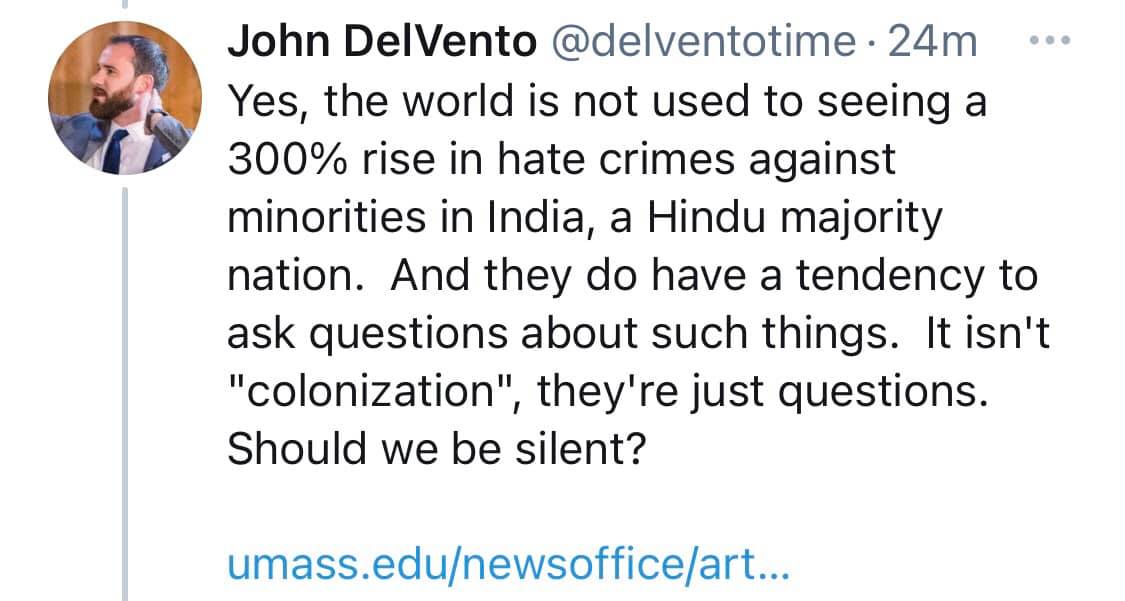Let's talk about data.
Because folks like John keep spewing "data" about the persecution non-Hindus, women, and demographic minorities in India face whenever Hindus talk about Hindu oppression. (1/n)
Because folks like John keep spewing "data" about the persecution non-Hindus, women, and demographic minorities in India face whenever Hindus talk about Hindu oppression. (1/n)
The intellectual dishonesty of this "data" perpetuates the gaslighting of Hindus, which understandably leads to anger, "validating" the view that the "data" is accurate. It's a vicious cycle of perception and demonization that is exhausting. I know many are exhausted. (2/n)
Here are some key points about data that I hope will help. (Disclaimer: This isn't comprehensive. It's just a start.) (3/n)
1. DATA ISN'T INHERENTLY NEUTRAL. Data collection methodology means someone decides what to collect and how to measure it. Bias may arise bc of funding by an organization committed to a particular finding. (e.g. Amnesty International predetermined their Kashmir findings (4/n).
2. DATA IS CURATED. This means some data is collected and other data is left out.
If data collection methodology and its limitations are made transparent, then the person reading the report has a much better sense of the limitations of the analysis. (5/n)
If data collection methodology and its limitations are made transparent, then the person reading the report has a much better sense of the limitations of the analysis. (5/n)
3. SELF-REPORTED DATA IS WEAK AND CAN BE CONTRAINDICATIVE. Much of the data collected about "communal" violence against non-Hindus in India (including the data in the report that John links) is self-reported through Citizen's Crime Hate Watch. (6/n)
Self-reported data is known to be weak (self-selected participation, respondents tend to react to what they perceive are the data collector's expectations). Moreover, in the case of religious violence reporting in India, there are so many contraindicative reasons why... (7/n)
...there could be a rise in the self-reporting of crimes against religious minorities, including the fact that those minorities feel SAFER reporting bc they feel they will get justice. Conversely, Hindus may be underreporting because they feel they will *not* get justice. (8/n)
4. DATA ANALYSIS CURATES DATA. If the analyzer isn't transparent about why data was included/excluded, this is suspect analysis (i.e., folks who use data to support the narrative that India is the "rape capital" of the world fail to globally contextualize the statistics.) (9/n)
5. PAY ATTENTION TO DATA GAPS. Data is political, particularly data that the government collects (or doesn't) that relates to hot button issues. (The psychology of India's post-colonial government is not the same psychology of the US' settler colonial government.) (10/n)
India's population density and poverty make it fairly impossible for there not to be intergroup violence in every direction. "Why do I not hear about violence towards Hindus?" is a realistic, context-informed question. (11/n)
"I don't hear about violence towards Hindus, so it mustn't exist at the same scale as violence BY Hindus" is simply illogical. Get your heads out of your wealthy, sparsely populated Western-privileged contexts. (12/n)
6. CORRELATION ≠ CAUSATION. CORRELATION itself is REALLY hard to show in social science analysis. CAUSATION is nearly IMPOSSIBLE. The article that John linked ( https://www.umass.edu/newsoffice/article/umass-economist-finds-hate-crimes-against?fbclid=IwAR0c1-dE_ljpsnqNsyEBAguhG2U9EbtVaSj4GqDDExdcTYgjWUrliXJB5YM) takes self-report data and finds CAUSATION. It is methodologically unsound. (13/n)
Plus, tweet-length attention spans means studies get short-handed; causation is implied by combining a statistic with a snide allegation and a clever emoji, which then spreads like a virus until it seems like an empirical truth that only an irrational fascist would refute.(14/n)
7. ANECDATA ≠ DATA. Individuals' stories are relevant, of course. But there is often a context to them that we are not getting that completely changes how that story can be read and how it might inform us. (15/n)
The best example that comes to mind here is the tweet from the wealthy woke Indian who "had a real conversation with my taxi driver" about the state of Indian affairs; the Muslim taxi driver was "afraid he would lose his citizenship because of the CAA". (16/n)
The taxi driver clearly has sufficient documentation to register and drive his car, his citizenship is probably okay. So is the issue reality or unfounded fear? If it is the latter, who is perpetuating it? (17/n)
Second, the taxi drivers have learned exactly the stories the wealthy concerned woke Indian wants to hear; the stories that will earn them an extra tip. Taxi drivers are gonna hustle to feed their families. Is this universally true? No. (18/n)
But is it possible, given the enormous wealth disparity in India, that the story cannot be taken at face value? Yes. The data is about both people in the taxi in the context of India. Again, folks need to get their heads out of their wealthy Western contexts. (19/n)
In fact, this is exactly what makes John's gaze, data, and concern colonizing. These are precisely the ways in which reality is twisted to justify humanitarian, "civilizing" intervention, whether it is old school colonizing or U.S. Senate hearings about Kashmir. (20/n)
Grounding myself with meta-analysis like this helps me navigate the tsunami of misinformation and helps me unpack/convey what is happening to others; it's a lot more generative than reactive name-calling. If this thread helps anyone else, I'm doubly glad. Jai Guru Dev (21/21)
(21/21)
 (21/21)
(21/21)
8. DATA IS NOT INHERENTLY GENERALIZABLE. Particularly in India, where local religious contexts cannot be extrapolated to accurately represent national ones. Yet this is the tendency that folks have - even more so, it seems, when considering and sharing anecdata. (Extra credit)

 Read on Twitter
Read on Twitter


